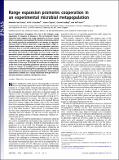| dc.contributor.author | Datta, Manoshi Sen | |
| dc.contributor.author | Korolev, Kirill Sergeevich | |
| dc.contributor.author | Dudley, Carmel R. | |
| dc.contributor.author | Gore, Jeff | |
| dc.contributor.author | Cvijovic, Ivana | |
| dc.date.accessioned | 2013-12-30T16:37:38Z | |
| dc.date.available | 2013-12-30T16:37:38Z | |
| dc.date.issued | 2013-04 | |
| dc.date.submitted | 2012-10 | |
| dc.identifier.issn | 0027-8424 | |
| dc.identifier.issn | 1091-6490 | |
| dc.identifier.uri | http://hdl.handle.net/1721.1/83361 | |
| dc.description.abstract | Natural populations throughout the tree of life undergo range expansions in response to changes in the environment. Recent theoretical work suggests that range expansions can have a strong effect on evolution, even leading to the fixation of deleterious alleles that would normally be outcompeted in the absence of migration. However, little is known about how range expansions might influence alleles under frequency- or density-dependent selection. Moreover, there is very little experimental evidence to complement existing theory, since expanding populations are difficult to study in the natural environment. In this study, we have used a yeast experimental system to explore the effect of range expansions on the maintenance of cooperative behaviors, which commonly display frequency- and density-dependent selection and are widespread in nature. We found that range expansions favor the maintenance of cooperation in two ways: (i) through the enrichment of cooperators at the front of the expanding population and (ii) by allowing cooperators to “outrun” an invading wave of defectors. In this system, cooperation is enhanced through the coupling of population ecology and evolutionary dynamics in expanding populations, thus providing experimental evidence for a unique mechanism through which cooperative behaviors could be maintained in nature. | en_US |
| dc.description.sponsorship | National Cancer Institute (U.S.) (Cancer Center Support Grant P30CCA14051) | en_US |
| dc.description.sponsorship | United States. Dept. of Defense (National Defense Science and Engineering Graduate Fellowship Program) | en_US |
| dc.description.sponsorship | MIT Department of Physics Pappalardo Program (Fellowship) | en_US |
| dc.description.sponsorship | Massachusetts Institute of Technology. Undergraduate Research Opportunities Program | en_US |
| dc.description.sponsorship | National Institutes of Health (U.S.) (R00 Pathways to Independence Award GM085279-02) | en_US |
| dc.description.sponsorship | National Science Foundation (U.S.) (Career Award PHY-1055154) | en_US |
| dc.description.sponsorship | Pew Charitable Trusts (Fellowship 2010-000224-007) | en_US |
| dc.description.sponsorship | Alfred P. Sloan Foundation (Fellowship BR2011-066) | en_US |
| dc.description.sponsorship | National Institutes of Health (U.S.) (New Innovator Award DP2) | en_US |
| dc.language.iso | en_US | |
| dc.publisher | National Academy of Sciences (U.S.) | en_US |
| dc.relation.isversionof | http://dx.doi.org/10.1073/pnas.1217517110 | en_US |
| dc.rights | Article is made available in accordance with the publisher's policy and may be subject to US copyright law. Please refer to the publisher's site for terms of use. | en_US |
| dc.source | PNAS | en_US |
| dc.title | Range expansion promotes cooperation in an experimental microbial metapopulation | en_US |
| dc.type | Article | en_US |
| dc.identifier.citation | Datta, M. S., K. S. Korolev, I. Cvijovic, C. Dudley, and J. Gore. “Range expansion promotes cooperation in an experimental microbial metapopulation.” Proceedings of the National Academy of Sciences 110, no. 18 (April 30, 2013): 7354-7359. | en_US |
| dc.contributor.department | Massachusetts Institute of Technology. Computational and Systems Biology Program | en_US |
| dc.contributor.department | Massachusetts Institute of Technology. Department of Physics | en_US |
| dc.contributor.mitauthor | Datta, Manoshi Sen | en_US |
| dc.contributor.mitauthor | Korolev, Kirill Sergeevich | en_US |
| dc.contributor.mitauthor | Dudley, Carmel R. | en_US |
| dc.contributor.mitauthor | Gore, Jeff | en_US |
| dc.relation.journal | Proceedings of the National Academy of Sciences | en_US |
| dc.eprint.version | Final published version | en_US |
| dc.type.uri | http://purl.org/eprint/type/JournalArticle | en_US |
| eprint.status | http://purl.org/eprint/status/PeerReviewed | en_US |
| dspace.orderedauthors | Datta, M. S.; Korolev, K. S.; Cvijovic, I.; Dudley, C.; Gore, J. | en_US |
| dc.identifier.orcid | https://orcid.org/0000-0001-6843-9843 | |
| dc.identifier.orcid | https://orcid.org/0000-0003-4583-8555 | |
| mit.license | PUBLISHER_POLICY | en_US |
| mit.metadata.status | Complete | |
